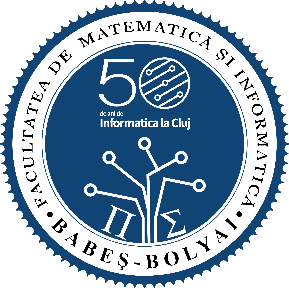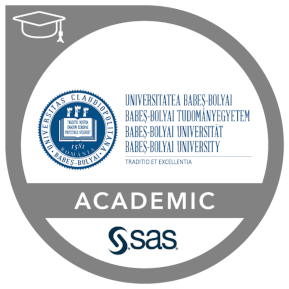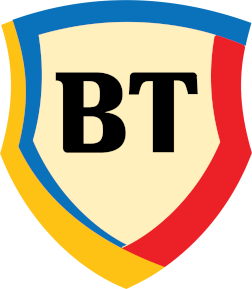Data Science for Industry and Society MA Programme
The demand for data skills has been growing at a rapid rate and will continue to progress for years to come. According to the World Economic Forum (WEF), Data and AI will experience the highest annual growth rate for job opportunities, at 41%. It’s no surprise that the need for these skills is greater than the ability to fulfil the requirements, hence the term “skills gap” that continues to be a hot topic throughout the job market.
How did we get here? WEF estimates that by 2025, 463 exabytes of data will be created each day globally. From the amount of data that people are creating each day, there’s no question that organizations need talented individuals to digest this data, discover patterns and make informed decisions. Job capacity for roles in data analysis, AI and machine learning is estimated to increase by 20 million by 2025.
Faculty of Mathematics and Computer Science, University Babeș-Bolyai Cluj-Napoca, with the largest doctoral school in Artificial Intelligence in Romania and a top ecosystem in information technology (IT), in cooperation with SAS, the global leader in Advanced Analytics and Business Intelligence Software solutions, and Banca Transilvania, one of the top banks in Romania, as a beneficiary and strategic contributor of the human resource in advanced analytics, inaugurate a new master program Data Science for Industry and Society.



The new academic program will strengthen and develop the Romanian IT ecosystem, capitalizing on the competitive advantages of the largest computer science faculty in Romania in domains like Artificial Intelligence, Big Data & High Performing Computing, Strategic Digitization and Cyber-Security.
The master program "Data Science for Industry and Society", that benefits from the prestigious SAS Academic Specialization Big Data Analytcs and Data Science, is a professional master program and aims to develop the professional and transversal skills of the students according to the European Qualifications Framework, preparing highly qualified specialists in the field of advanced data analysis, data science.
The Master Program covers the fundamental areas of the data analytics and data science:
- programming Essentials for Data Processing/Computational Thinking in the context of data science
- collect, model, and manage data effectively using best practice data-wrangling techniques
- data visualization, machine learning, advanced visual text analytics, forecasting and predictive modelling
- integration between open-source software (Python) and commercial software
- data analysis by designing and utilising proven data analytics approaches
- critically analyse and address the ethical and social issues of data analysis
- internship program for top students of the Master Program provided by Banca Transilvania and SAS Romania
As a result of following the full curriculum, on top of digital badges that the students can benefit from the learning Master courses curriculum and the courses from SAS Skill Builder for Students, the Master program offers the students the opportunity to acquire industry certifications for data analysis.
The internship program developed in cooperation with Banca Transilvania offers the opportunity to practice the acquired skills and competencies and decide about the next steps of your career.
The program will be taught in English language.
More information about the admission process is available here (in English) and here (in Romanian).
Motivation
- Huge amount of data is collected and digitally stored; predict the potential of data is a must in the current world
- uses data science to understand and predict phenomena, such as consumer, market, health and world economic trends.
Target
The ideal candidates have graduated in programs with a good mathematical or computer science basis. However, we also welcome candidates from other disciplines having excellent academic records, who wish to develop their data analysis abilities. Thus, the programme is targeting:
- mathematics and computer science graduates interested to use and analyse data from different domain such as finance, health, biology, public administration, etc.; the program gives recent graduates with strong analytical skills the possibility to specialize in applied data work.
- people interested in data management and analysis techniques who want to enter the company in a central role for business and value creation; the applied nature of the course aims to be accessible to people that have work experience in public or private organizations and have worked with data inside these organizations.
The program includes brushup courses in data curation and management, to ensure all students have a sufficient basic toolkit.
Purposes
We welcome students from different disciplines.For students interested in more theoretical studies, the program also opens up an opportunity of continuing with PhD studies in a dynamic, active research environment.
- learn how to navigate the entire data science pipeline from information acquisition to the final product
- how to collect, mine and store data
- how to clean, analyze, model and visualize data
- how to make decision based on data
- learn how to manage data science projects involving real-world data and how to demonstrate advanced modeling skills for economic, industrial, scientific phenomena and processes,
- learn to develop methods about data analysis and processing, machine learning, recommender systems, optimization
Gained Abilities and Skills
- ability to provide adequate data analysis for decision-making problems.
- programming skills necessary to extract data from various source of information
- ability to approach problems from different angles and to be aware of complementarities in knowledge on interdisciplinary teams
- acquire skills needed to transform large amounts of information into complex projects, by using a wide range of quantitative and qualitative methods
Requirements
- self-driven and motivated to learn
- aware about the importance of data analysis in a particular domain (health, economics, psychology, biology, chemistry, etc.)
Our proposal
- Real-world projects from industry experts
- Identify the opportunities where data mining and artificial intelligence (especially machine learning) can improve marketing and sales, insurance, fraud detection, the power of genomic analysis, and more other topics.
- Technical mentor support and project feedback from experienced reviewers
- The proposed solutions to the tackled problems will be constructed by means of both the state-of-the-art AI techniques and the business-side best practices.
- Student community
- Possibility to work and share knowledge with more technical students (from other MA programs)
- Team work, assuming different execution and leading roles, performing professional tasks with considerable amounts of autonomy and responsibility.
 Data Science for Industry and Society Roadmap.xlsx
Data Science for Industry and Society Roadmap.xlsx
1st semester
- Data ethics
The course is aimed to analyze the ethical aspects related to the privacy and control of information, to examine the ethical and privacy implications of collecting and managing large/big data. AI fairness will be considered also.
- Data toolkit
Introduction in Version Control Systems and systems for information management.
- Basics of statistics
Understand the fundamentals of statistics. Formulating a statistical investigative question, collecting, or considering data, analyzing data, and interpreting results. Usage of statistical exploratory data analysis tools. Understand the broad directions of descriptive and inferential statistics and use this information for making informed choices in analyzing data.
- Computational thinking
Introduction to programming languages that help data scientists organize structured and unstructured information. Understanding the foundations of data science, evaluating how the data science process can be used to address business problems.
- Data collection and modeling I
This course will cover the basic ways that data can be obtained (from the web, from APIs, from databases and from colleagues in various formats), cleaned, stored and shared. Methods for processing raw data, instructions and/or codebooks.
2nd semester
- Data mining
This course covers the essential exploratory techniques for summarizing data, for eliminating or sharpening potential hypotheses about the world that can be addressed by the data.
- Programming toolbox
Introduction to the main tools and ideas in the data scientist's toolbox. You will learn how to install and configure software necessary for a programming environment and describe generic programming language concepts as they are implemented in a high-level language. Topics in statistical data analysis and machine learning will provide working examples.
- Intelligent modelling
Introduction to the basic components of building and applying a range of model based and algorithmic machine learning methods (regression, classification trees, Naive Bayes, random forests, etc.) with an emphasis on practical applications. The course will provide basic grounding in concepts such as training and tests sets, overfitting, and error rates. Details about how to evaluate the performance of an intelligent system will be provided.
- Optional course
3rd semester
- Data visualization
"A picture is worth a thousand words". The course is aimed to learn how to leverage a software tool to visualize data, better understand the data, and make more effective decisions. Learning how to present that data in a form that makes sense to people.
- Forecasting and predictive modelling
This course will help to get practical with data analysis, turning data science methods into real-world outcomes.
- 2 optional courses
4th semester
- Internship
- Project in Data Science
- Elaboration of the dissertation thesis





